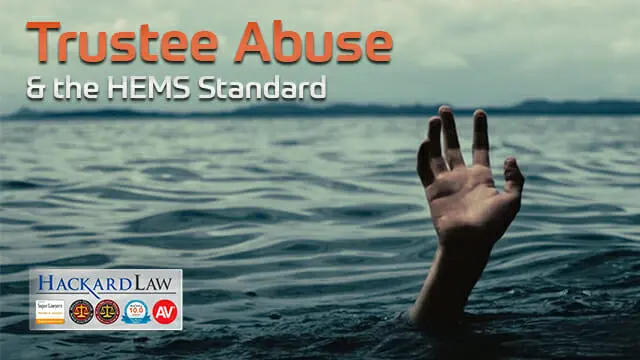
Trustee Abuse | Health, Education, Maintenance & Support
Imagine these common circumstances. You are your father’s only child. You are 40 years old – a single mom raising two minor children. Your father sets up a trust for his benefit during his lifetime and at his death, for your benefit during your lifetime.
Your father is the sole trustee of the trust during his lifetime. Your father, at the recommendation of his estate planning lawyer, names a fiduciary licensed by the California Professional Fiduciaries Bureau as his successor trustee.
The fiduciary has been licensed for several years and focuses on conservatorships. The fiduciary’s website says that he also administers trusts. Your father meets with the fiduciary once before executing the trust instrument. Your father’s expressed intent in the trust instrument identifies his primary purpose to support you during your life.
Any undistributed trust assets at your death are left to St. Jude Children’s Research Hospital. Your father expresses his intent hat the trust is established for your health, education, maintenance and support. This is often called the HEMS standard. That is, the trustee shall distribute sufficient funds to you for your health, education, maintenance and support. You learn that this standard is specifically referenced in Internal Revenue Code Section 2041(b)(1)(A).
Your father dies. You meet with the estate planning lawyer and the fiduciary a few weeks after your father’s funeral. You learn that under the terms of the trust, the fiduciary is now the successor trustee. The trustee estimates that there is $4 million dollars in the trust.
The fiduciary indicates that he is gathering trust assets. He wants to know if you have any of your father’s property. He tells you to move out of your father’s house.
He makes no inquiry whatsoever as to your health, insurance requirements, living expenses, school expenses or general standard of living. The trustee acts like and says he has unlimited discretion in making any principal or income distributions to you. He’s apparently more interested in having an estate sale and selling your father’s house.
At the present time he indicates that he is inclined to give you nothing. He wants to preserve capital. You wonder: Does he have unlimited discretion? Did my father make the trust to benefit a licensed fiduciary whom he met once in his lifetime? Wasn’t the trust made for my support?
You have some common-sense observations. Isn’t the trustee required to diligently and in good faith investigate your need for support before declining to make a distribution? Aren’t the trustee’s actions extraordinarily imprudent, unreasonable and substantially out of step with the settlor’s (your father’s) intent?
- Are the trustee’s actions in good faith?
- In accordance with terms and purposes of the trust?
- In the interest of the beneficiary?
- Isn’t the trustee under a duty to act?
While the trustee has an ascertainable discretion to make distributions for your support, does such an ascertainable discretion include the discretion to pay nothing, to contribute nothing for your support?
So, the referenced circumstances are just one example as to how beneficiary litigation against trustees can come about. Circumstances differ in every case.
If you want to speak with Hackard Law about your circumstances call us at 916 313-3030. We focus on significant estate, trust, probate and elder financial abuse litigation in California’s largest urban Superior Courts, including Los Angeles, Orange, Santa Clara, San Mateo, Alameda, Contra Costa and Sacramento Counties.

 (916) 775-8542
(916) 775-8542